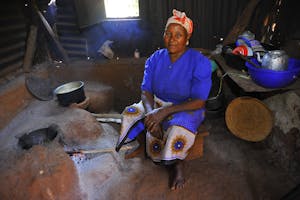Editor’s Note: In March, we featured the blog post below on one of the world’s silent killers: dangerous smoke from traditional cookstoves. On Tuesday, October 21, from 10:30am-11:30am ET, the Global Alliance for Clean Cookstoves and partners will hold a Twitter chat to raise awareness of the power of clean cooking solutions to improve health and save lives. We hope you will join the chat using hashtag #cookstoves and learn more about the upcoming Cookstoves Future Summit. Follow @cookstoves on Twitter to stay engaged in the issue.
 Did you know that over 4 million people lost their lives in 2012 due to household air pollution? Around the world, 3 billion people burn solid fuels such as wood and charcoal for their daily cooking needs. The resulting smoke can lead to a range of negative consequences for both human health and the environment.
Did you know that over 4 million people lost their lives in 2012 due to household air pollution? Around the world, 3 billion people burn solid fuels such as wood and charcoal for their daily cooking needs. The resulting smoke can lead to a range of negative consequences for both human health and the environment.
New global estimates from the World Health Organization (WHO), just released yesterday, report that the 4.3 million deaths attributable to household air pollution occurred overwhelmingly in low- and middle-income countries in the South East Asia and Western Pacific regions.
WHO’s findings also estimate that the joint effects of household air pollution and ambient air pollution contributed to more than 7 million deaths in 2012, representing one in eight deaths globally. This confirms that air pollution is now the world’s largest single environmental health risk.
The Global Alliance for Clean Cookstoves, a public-private partnership initiative of the United Nations Foundation, is working to address this risk by creating a global market for clean and efficient household cooking solutions. Here are a few reasons why clean cooking solutions matter.
1) Exposure to smoke from traditional cookstoves and open fires can cause a range of health problems and injuries. These include a variety of respiratory, cardiovascular, eye, and skin ailments, from cancer to emphysema to heart disease. Countless people also suffer from severe cooking-related burns and other related injuries.
2) A recent Lancet report found that household air pollution from cooking is the 4th greatest health risk in the world after high blood pressure, alcohol, and tobacco.
3) About half of child deaths from pneumonia – the greatest killer of children ages 0 to 5 – are due to household air pollution exposure.
4) Relying on biomass for cooking and heating forces women and children to spend many hours each week collecting fuel for cooking, time that could be spent on economic or educational pursuits. Women also face severe personal security risks as they search for fuel, especially in refugee and conflict contexts.
5) Using solid biomass as fuels also depletes forests and releases a toxic mix of pollutants that contribute to climate change.
Want to learn more or get involved in the Global Alliance for Clean Cookstoves’ work? Click here and follow @cookstoves on Twitter.



 View All Blog Posts
View All Blog Posts